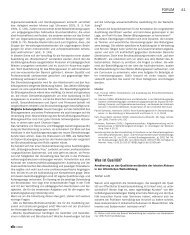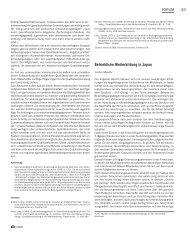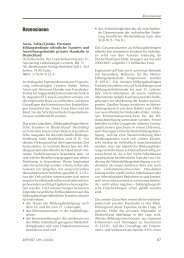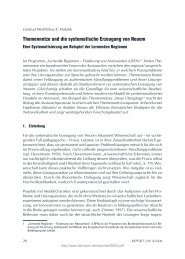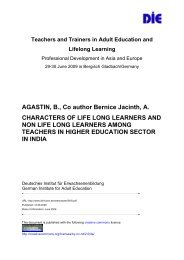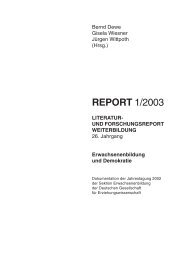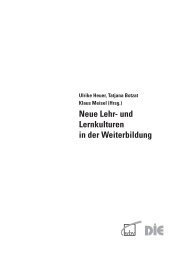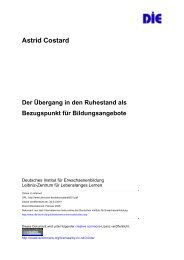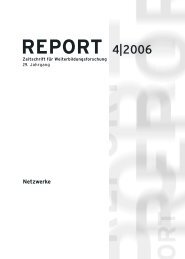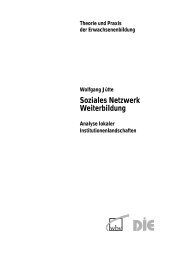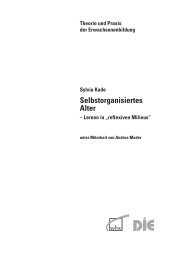Accreditation of Prior Experiential Learning (APEL)
Accreditation of Prior Experiential Learning (APEL)
Accreditation of Prior Experiential Learning (APEL)
You also want an ePaper? Increase the reach of your titles
YUMPU automatically turns print PDFs into web optimized ePapers that Google loves.
The most common approach across European universities is the use <strong>of</strong> a portfolio for<br />
demonstrating experiential learning through documentation such as minutes <strong>of</strong> meetings,<br />
essays, letters etc. to support claims for <strong>APEL</strong>. This was substantiated through a<br />
2001-2002 European study (EU, Socrates Adult Education). The learner submits the<br />
portfolio for formal assessment and, if successful, receives either credit or admission to<br />
a particular course or programme. In Finland, however, learners generally make a<br />
claim through a personal development plan which consists <strong>of</strong> personal information<br />
about a person’s progress in study and in work based learning and evidence <strong>of</strong> achievements.<br />
The process <strong>of</strong> <strong>APEL</strong> is interpreted differently within Europe. In France emphasis<br />
is placed on the learner’s ability to engage in problem-solving and critical thinking.<br />
This approach recognises that not only are the processes <strong>of</strong> experiential learning different<br />
but that the outcomes <strong>of</strong> these processes also differ. In contrast, in the UK greater<br />
emphasis is placed on establishing equivalence between the outcomes <strong>of</strong> experiential<br />
learning and the outcomes <strong>of</strong> a particular academic programme or module against<br />
which the learner is seeking credit for exemption.<br />
The Socrates projects revealed that there is no common framework to using portfolios<br />
either within a particular country or across Europe. What is expected from a learner<br />
varies greatly from country to country (Cleary et al. 2002).<br />
5. <strong>APEL</strong> from the Learner Perspective<br />
Literature on <strong>APEL</strong> largely discusses the issues from the perspective <strong>of</strong> the institution,<br />
yet in order to secure good <strong>APEL</strong> systems it is important to listen to the experiences <strong>of</strong><br />
the learners. The following section draws on the voices <strong>of</strong> learners in higher education<br />
across Europe, interviewed as part <strong>of</strong> a SOCRATES project (Cleary et al. 2002). The<br />
majority <strong>of</strong> learners in this study had not heard <strong>of</strong> <strong>APEL</strong> before embarking on writing a<br />
portfolio. All were using the developmental model <strong>of</strong> <strong>APEL</strong>. When they first learnt<br />
about the possibility <strong>of</strong> using <strong>APEL</strong> participants thought it sounded too abstract. A common<br />
practice is for universities to run initial group tutorials to explain what <strong>APEL</strong> is and<br />
what is expected <strong>of</strong> the student. Many <strong>of</strong> the learners had been out <strong>of</strong> the education<br />
system for a long time. Others were part way through part-time degree courses. Their<br />
experience <strong>of</strong> learning from initial schooling is that learning is structured, directed and<br />
prescriptive. Not surprisingly several still felt unsure about what an <strong>APEL</strong> portfolio was<br />
and what they had to do to achieve it after the initial tutorials. Some stated that their<br />
understanding was confused by the delivery given by tutors and <strong>APEL</strong> co-ordinators,<br />
whilst others articulated a need for more structure and more clarity about what a case<br />
for <strong>APEL</strong> should look like.<br />
For many the difficulty associated with <strong>APEL</strong> revolved around the fact that they could<br />
draw on their own life experiences rather than present ‘academic’ material. Generally<br />
with the portfolio approach students are <strong>of</strong>fered individual tutorials. Some felt that<br />
once they started the <strong>APEL</strong> process they did not require any further guidance; others<br />
62


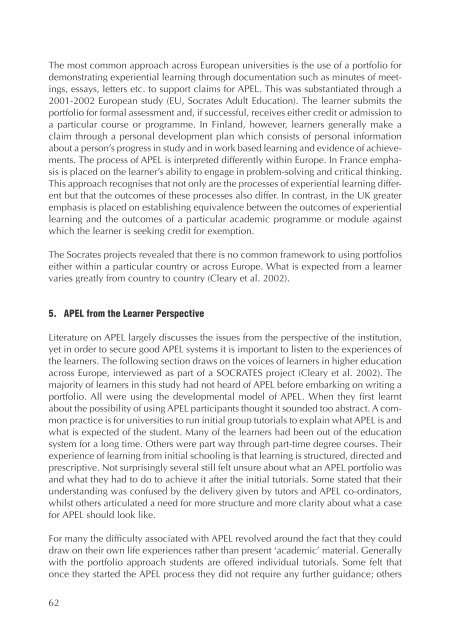
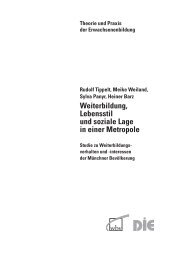
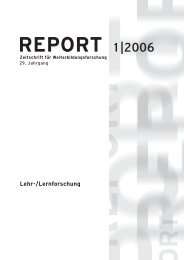
![PDF [KB 892] - Deutsches Institut für Erwachsenenbildung](https://img.yumpu.com/7495168/1/144x260/pdf-kb-892-deutsches-institut-fur-erwachsenenbildung.jpg?quality=85)
